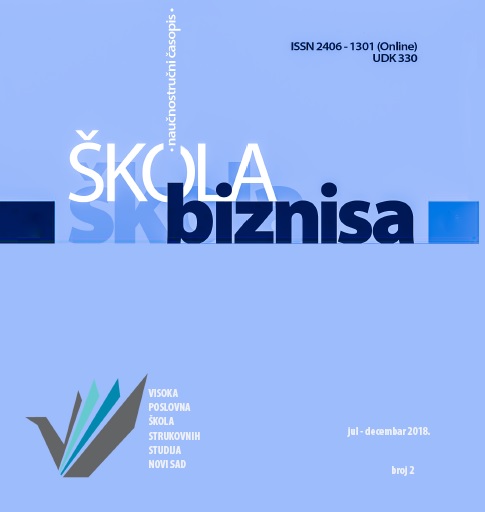THE EFFECT OF GENDER, AGE AND ACADEMIC RANK ON WORK-LIFE BALANCE
Abstract
Work-life balance has been a topic of various research where researches has been mostly concerned with the influence of organizational practices and policies on work-family balance. On the other side the relation between demographics and work-life balance, particularly in academics sphere, has not been well investigated. Therefore we test in our research how gender, age and the academic rank affect work-life balance among higher education lecturers. Participants in this study were higher education lecturers from Austria, Croatia, Czech Republic, Germany, Serbia and Slovenia.
The results of our research show that with a higher academic rank the work-life balance among higher education lecturers’ increases. Results show no difference in work-life balance among higher education lecturers based on gender. Potential curvilinearity between age and work-life balance among higher education lecturers was not confirmed due to the lack of statistical significance.
The results of this study give better insights into the basic demographics’ effect on work-life balance, particularly among higher education lecturers. Results of this study can be used both for further research and in practice.
References
Bedarkar, M., & Pandita, D. (2014). A study on the drivers of employee engagement impacting employee performance. Procedia - Social and Behavioral Sciences, 133, 106–115.
Boyar, S. L., Maertz, C. P. Jr., Mosley, D. C. Jr., & Carr, J. C. (2008). The impact of work/family demand on work-family conflict. Journal of Managerial Psychology, 23(3), 215-235.
Brough, P., Timms, C., O'Driscoll, M. P., Kalliath, T., Oi-Ling Siu, Sit, S. & Lo, D. (2014). Work–life balance: a longitudinal evaluation of a new measure across Australia and New Zealand workers. The International Journal of Human Resource Management, 25(19), 2724-2744.
Caesens, G., & Stinglhamber, F. (2014). The relationship between perceived organizational support and work engagement: The role of self-efficacy and its outcomes. Revue européenne de psychologie appliquée, 64, 259–267.
Erdamar, G. & Demirel, H. (2014) Investigation of work-family, family-work conflict of the teachers. Procedia - Social and Behavioral Sciences 116( 2014), 4919 – 4924.
Etikan, I., Abubakar Musa, S., & Sunusi Alkassim, R. (2016). Comparison of Convenience Sampling and Purposive Sampling. American Journal of Theoretical and Applied Statistics, 5(1), 1-4.
Ferguson, M., Carlson, D., Zivnuska, S., & Whitten, D. (2012). Support at work and home: The path to satisfaction through balance. Journal of Vocational Behavior, 80, 299–307.
Greenhaus, J. H., Ziegert, J. C., & Allen, T. D. (2012). When family-supportive supervision matters: Relations between multiple sources of support and work–family balance. Journal of Vocational Behavior, 80, 266–275.
Guest, D. E. (2002). Perspectives on the Study of Work-life Balance. Social Science Information, 41(2), 255-279.
Kashyap, S., Joseph, S., & Deshmukh, G. K. (2016) Employee Well - Being, Life Satisfaction and the need for Work - Life balance. Journal of Ravishankar University, Part - A, 22, 11 -23.
Lapierre, L. M., Spector, P. A., Allen, T. D., Poelmans, S., Cooper, C. L., O’Driscoll, M. P., Sanchez, J. I., Brough, P., & Kinnunen, U. (2008). Family-supportive organization perceptions, multiple dimensions of work–family conflict, and employee satisfaction: A test of model across five samples. Journal of Vocational Behavior, 73, 92–106.
Maxwell, G. A. (2005). Checks and balances: the role of managers in work–life balance policies and practices. Journal of Retailing and Consumer Services, 12, 179–189.
McMillan, H. S., Morris, M. L., & Atchley, E. K. (2011) Constructs of the Work/ Life Interface: A Synthesis of the Literature and Introduction of the Concept of Work/Life Harmony. Human Resource Development Review, 10(1) 6-25.
Othman, N., Yusof, S. A. M., & Osman, W. R. S. (2009). A Conflict between Professional vs. Domestic Life? Understanding the Use of ICT in Teleworking for Balance in Work and Family Units. Computer and Information Science, 2(2), 3-15.
Parakandi, M., & Behery, M. (2016). Sustainable human resources: Examining the status of organizational work–life balance practices in the United Arab Emirates. Renewable and Sustainable Energy Reviews, 55, 1370–1379.
Roeters, A. (2011). Cross-National Differences in the Association Between Parental Work Hours and Time with Children in Europe: A Multilevel Analysis. Soc Indic Res, 110, 637–658.
Skinner, N., & Pocock, B. (2008). Work—life conflict: Is work time or work overload more important? Asia Pacific Journal of Human Resources, 46, 303-315.
Southworth, E. M. (2014). Shedding gender stigmas: Work-life balance equity in the 21st century. Business Horizons, 57, 97—106.
Stier, H., Lewin-Epstein, N., & Braunc, M. (2012) Work-family conflict in comparative perspective: The role of social policies. Research in Social Stratification and Mobility, 30, 265–279.
Sukalova, V., Ceniga, P., & Janotova, H. (2015). Harmonization of work and family life in company management in Slovakia. Procedia Economics and Finance, 26, 152 – 159.
Suresh, S., & Kodikal, R. (2017). SEM approach to explore Work Life Balance: A study among nurses of Multispecialty Hospitals. SJOM, Sahyadri Journal of Management, 1(1), 1-17.
Trefalt, S., Drnovsek, M., Svetina-Nabergoj, A., & Adlesic, R. V. (2013). Work-life experiences in rapidly changing national contexts: Structural misalignment, comparisons and choice overload as explanatory mechanisms. European Management Journal, 31, 448– 463.
Turliuc, M. N., & Buliga, D. (2014) Work-Family Conflict and Job and Family Satisfaction. The Mediating Role of Cognitions. Procedia - Social and Behavioral Sciences, 159, 105–109.
- Authors retain copyright and grant the journal right of first publication with the work simultaneously licensed under a Creative Commons Attribution License that allows others to share the work with an acknowledgement of the work's authorship and initial publication in this journal.
- Authors are able to enter into separate, additional contractual arrangements for the non-exclusive distribution of the journal's published version of the work (e.g., post it to an institutional repository or publish it in a book), with an acknowledgement of its initial publication in this journal.
- Authors are permitted and encouraged to post their work online (e.g., in institutional repositories or on their website) prior to and during the submission process, as it can lead to productive exchanges, as well as earlier and greater citation of published work (See The Effect of Open Access).

